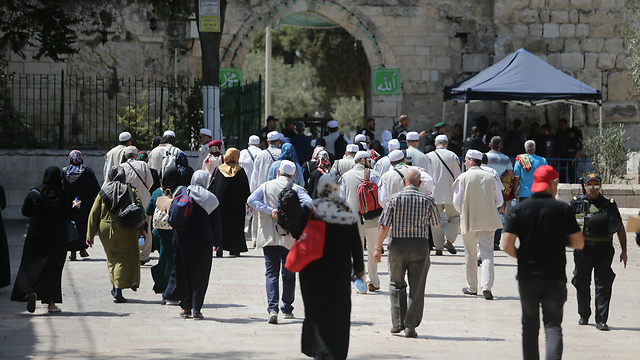

Equal rights? Not for everyone apparently
Op-ed: The apartheid-like notions revealed in Jews’ attitudes towards Israel’s Arabs are a symptom of a disease being adopted by the entire Israeli culture in the name of the national struggle—rejecting the equality principle, a principle which is the basis of democracy and human rights.
This is particularly evident among Israel’s largest group, people affiliated with the Right (ultra-Orthodox, national-religious and right-wing secular Jews). About 40 percent of the respondents (the large majority of whom are affiliated with the Right) believe Jews should have extra rights in the State of Israel. About 41 percent (in the same composition) believe Arabs should be allowed to purchase lands only in Arab communities. Twenty-five percent believe they should not be allowed to purchase lands at all.
About 51.5 percent believe Jews and Arabs should live separately. The majority of Jews (about 66 percent) are against adding Arab parties (of any kind) to the government and appointing Arab ministers. The majority of Jews (68 percent) believe a person cannot feel Palestinian and be a loyal citizen of the state at the same time. The majority of Jews (52.5 percent) believe Israel’s Arab citizens are interested in the state’s destruction.

Fifty-eight percent of the Jewish respondents believe the state must revoke the citizenship of people who refuse to declare that Israel is the Jewish people’s nation state. Considering the fact that most Arab respondents (67 percent) believed the State pf Israel has no right to define itself as the Jewish people’s nation state (as opposed to a state of all its citizens, which they do acknowledge)—the explosive potential is clear.
I don’t think that the Jews’ attitude towards the Arabs stems from pure racism, although there is racism within Jewish society (and in the Arab society as well, to a certain extent). The tensions between Jews and Arabs in Israel stem first of all from the national conflict, and other issues are coming along for the ride.
It’s reasonable to assume, for example, that if there was no conflict, the public mainstream would be less attentive to racist ideas that present themselves as Jewish tradition—just like it largely ignores the attempt to apply these idea to Christians, for example. It’s reasonable to assume that if this were just about tensions between the majority and a minority, without the violent conflict between Israel and the Arabs and without the battle between the West and radical Islam in its wider sense, the views would be more moderate. The Arab political leadership, which appears to be more radical than its voters, contributes to the tensions as well.
We shouldn’t find comfort in all these insights, however. The Israeli public isn’t settling for the demand to apply stricter “security checks” on the Arabs. It sees Israel’s Arabs as a foreign element (how ironic, considering the fact that they are the original inhabitants of the place rather than a community of immigrants), a minority whose presence we must tolerate having no other choice. This is reflected in the Jews’ feeling that Israel’s Arabs are interested in the state’s destruction (a view which isn’t expressed by the Arab respondents) and in their feeling that it is illegitimate for Israel’s citizens not to see themselves as part of the Zionist project (in other words, to recognize the state’s political legitimacy—as the vast majority of them do—but not that it is the Jewish people’s nation state).
An Arab who refuses to accept this definition (Haredi Jews, for example, are allowed to reject it) should be punished by having his citizenship revoked—in other words, by having all his civil rights revoked. The perception that the only way for an Arab to be a loyal citizen is by denying his Palestinian identity is a rejection of the dual national identity principle as part of being loyal to a state, which allowed—and still allows—Jews all over the world to feel like loyal citizens of their countries and loyal sons of their people.
The apartheid-like elements revealed in the respondents’ views (a demand for separation, a ban on purchasing lands, a demand for extra rights for Jews, lack of interest in the Arabs’ language and culture, an objection to the appointment of Arab ministers) are a symptom of a disease being adopted by the entire Israeli culture in the name of the national struggle—rejecting the equality principle, a principle which is the basis of democracy and human rights.
The attack on the equality principle is an expression of nationalism whose roots are religious-cultural (“we are the chosen people”) and political-cultural (the entire world is against us, we are in a constant danger of destruction), and its fruits pop up in every single site. These fruits are poisoned.
As soon as it is determined that equality is not a value, discrimination won’t remain in one area only. It will infiltrate everywhere—against those who the majority doesn’t wish to honor. The hostile and discriminating attitude towards Arabs is just the beginning.















